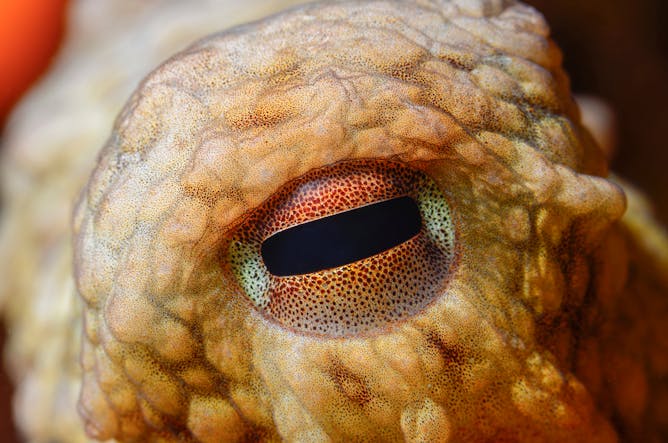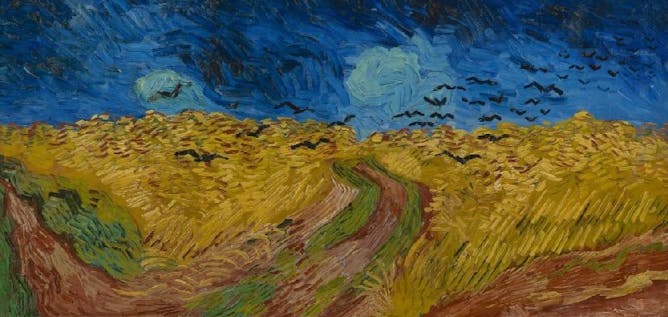|
The world’s first indoor octopus farm in Gran Canaria could produce 3,000 tonnes of meat a year from a thousand tanks according to the Spanish company behind the proposals. But satisfying a growing global appetite for the mollusc by farming it isn’t as simple as it sounds.
Octopuses are playful, astute and prolific tool users which have so far eluded efforts to breed them in captivity. These qualities should disqualify them from mass production, says Lindsay Hamilton, a professor of animal organisation studies at the University of York.
Octopuses are solitary by nature and would likely find captivity distressing, while research shows that routine slaughter by immersion in ice slurry is inhumane. Hamilton argues that arbitrary decisions over which species are worthy companions and which are “food-in-waiting” continue to produce unethical systems of food production.
Amsterdam’s Van Gogh Museum turns 50 this year and, to celebrate, The Conversation has published a series of articles that offer a fresh look at the post-impressionist painter, starting with a re-examination of the ‘tortured genius’
narrative. And to accompany a new instalment of our Great Mysteries of Physics podcast, a theoretical physicist looks at the problems the idea of a multiverse creates for science.
|

|
Jack Marley
Environment + Energy Editor
|
|

Osman Temizel/Shutterstock
Lindsay Hamilton, University of York
Octopuses are enigmatic beings whose experiences of industrial farming are likely to be profound.
|

Wheatfield with Crows by Vincent van Gogh (1890).
Van Gogh Museum, Amsterdam / Vincent van Gogh Foundation
Charlie Pratley, Nottingham Trent University
Museums have pushed the narrative of Vincent van Gogh as a ‘tortured genius’ for decades, but in its 50th year the Van Gogh Museum is questioning this approach.
|

Mike Workman/Shutterstock
Eugene Lim, King's College London
From string theory to observations, the multiverse theory is far from safe.
|
Politics + Society
|
-
Sam Power, University of Sussex
The former prime minister insists gatherings with wine were essential work meetings.
-
Catherine Gegout, University of Nottingham
The International Criminal Court sets a high bar for prosecuting heads of state for crimes committed while they are in power.
-
Tara Lai Quinlan, University of Birmingham
Police thinking of themselves as warriors can lead to distrust and aggression towards minority groups.
-
Thomas Gift, UCL
Florida governor Ron DeSantis is likely to be Donald Trump’s main opponent for the Republican presidential nomination.
-
Jingdong Yuan, University of Sydney
The recent Iran-Saudi Arabia diplomatic truce brokered by Beijing heightens expectations of Xi’s visit. But the Ukraine case is vastly different.
|
|
Arts + Culture
|
-
Oliver Davis, Cardiff University
Since 2011, professional and amateur archaeologists in Cardiff have been unearthing prehistoric artefacts. But last summer, they began to discover something even more extraordinary.
-
Chidiebere Ogbonnaya, University of Kent
Being an effective manager is more than just delegating tasks and pushing people – as Ted Lasso’s positive leadership shows.
-
Will Atkinson, University of Bristol
His letters reveal a man straining under pressure from his parents to help better their family name.
-
Frances Fowle, The University of Edinburgh
An art historian explains how Vincent van Gogh went from an unknown painter to one of the world’s most expensive artists.
|
|
Health
|
-
Louisa Shirley, University of Manchester; Suzanne Heywood-Everett, Leeds Beckett University
Older adults find it hard to get help for eating disorders.
-
Connor G G Bamford, Queen's University Belfast
New reports suggest the pandemic’s origins may be linked to raccoon dogs sold at Wuhan’s Huanan Wholesale Seafood Market. A virologist explains.
|
|
Environment
|
-
Josh Ettinger, University of Oxford
Raising such a depressing topic can feel awkward. Speaking up about climate change therefore takes courage.
|
|
Business + Economy
|
-
Spiros Bougheas, University of Nottingham
There are two types of systemic risk that can infect the highly interconnected global banking system.
|
|
Cities
|
-
Juan Miguel Kanai, University of Sheffield
If the Earth were ever subsumed into a single cityscape, it would collapse under the weight of its own ecological footprint.
|
|
Podcasts
|
-
Miriam Frankel, The Conversation
Some physicists believe we could one day find evidence of other universes.
|
|
|
|
| |
|
|
|
|
| |
| |
| |
| |
| |
|
|